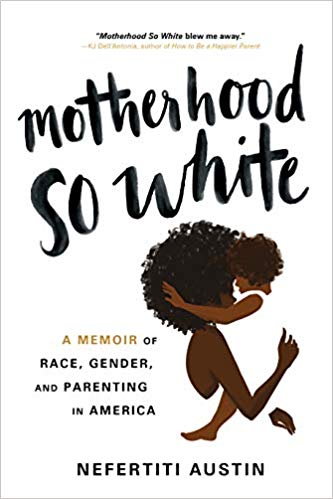College history instructor Nefertiti Austin could not find a parenting book that spoke to her experience as the Black single mother of an adopted Black son. She writes, “[M]y quest for narratives about Black mothers would be like looking for a needle in a haystack, but the white woman’s story would be told over and over.” Her book is not, however, primarily a manifesto or academic take examining this form of white centrality, though it certainly does do that. It is at heart a memoir, peppered with historical and cultural knowledge, meant to fill the gap she identified and give Black women encouragement in deciding “how to curate a family.” In other words, Motherhood So White is not written for me, and every word of this review should be taken with a grain of that salt.
 That said, Austin also writes to “begin to bridge the racial divide that currently encapsulates motherhood.” She seeks to inform white mothers what it’s like to have the word “single” synonymized with “welfare” when you happen to be Black. What it’s like to tell your child “that no one would look at him and assume he was a train aficionado or catcher for the championship Cardinals. The opposite would be true. White people would see a Black boy and judge him according to their preconceived notions.” What it’s like to have white teachers call a boy “angry” whenever he “may have been frustrated or annoyed or irritated.” What it’s like to be denied affection and softness, inculcated into “a hypermasculine culture that would protect [an African American male] on the outside but slowly kill him on the inside.”
That said, Austin also writes to “begin to bridge the racial divide that currently encapsulates motherhood.” She seeks to inform white mothers what it’s like to have the word “single” synonymized with “welfare” when you happen to be Black. What it’s like to tell your child “that no one would look at him and assume he was a train aficionado or catcher for the championship Cardinals. The opposite would be true. White people would see a Black boy and judge him according to their preconceived notions.” What it’s like to have white teachers call a boy “angry” whenever he “may have been frustrated or annoyed or irritated.” What it’s like to be denied affection and softness, inculcated into “a hypermasculine culture that would protect [an African American male] on the outside but slowly kill him on the inside.”
Women like me need to be informed and reminded of these differences between the two experiences of motherhood, as well as our duty to “be aware of … privilege and seek to build community with all mothers, regardless of race, religion, or socioeconomics.” On the flip side, Austin seeks to remind us that “Black mothers have a lot of child-rearing experience and plenty to say about the state of preschool, family leave, healthcare, nutrition, bullying, video games, and our socioeconomically segregated school system.” If we can focus on these commonalities and “coalesce[] around even one of these issues, it would ease the emotional and financial burden of parenting we all experience,” she writes.
It is undoubtedly a worthy endeavor.
As for execution, Austin’s prose not infrequently disappoints, becoming repetitive at both the level of theme and detail. But it can sing too, especially when she reflects on her father: “He never kicked his drug habit and was hooked on heroin when he was murdered in 1991, a victim of his own misdeeds and Black men’s expendability in America.” Austin also nails her takedown of a CNN article: “Blake did what mainstream media typically did to communities of color: affixed a label and then left us holding a bag filled with scandalous statistics, half-truths, and self-loathing.”
All told, Motherhood So White is both a worthwhile read and a valuable addition to the genre, even for those sitting outside the target audience.
Gail Cornwall is a former lawyer and public school teacher who now works as a stay-at-home mother and freelance writer in San Francisco.